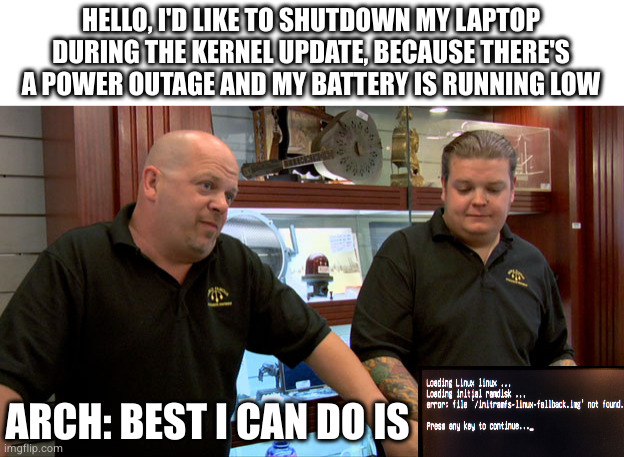this post was submitted on 04 Aug 2024
318 points (87.7% liked)
linuxmemes
21410 readers
975 users here now
Hint: :q!
Sister communities:
Community rules (click to expand)
1. Follow the site-wide rules
- Instance-wide TOS: https://legal.lemmy.world/tos/
- Lemmy code of conduct: https://join-lemmy.org/docs/code_of_conduct.html
2. Be civil
- Understand the difference between a joke and an insult.
- Do not harrass or attack members of the community for any reason.
- Leave remarks of "peasantry" to the PCMR community. If you dislike an OS/service/application, attack the thing you dislike, not the individuals who use it. Some people may not have a choice.
- Bigotry will not be tolerated.
- These rules are somewhat loosened when the subject is a public figure. Still, do not attack their person or incite harrassment.
3. Post Linux-related content
- Including Unix and BSD.
- Non-Linux content is acceptable as long as it makes a reference to Linux. For example, the poorly made mockery of
sudoin Windows. - No porn. Even if you watch it on a Linux machine.
4. No recent reposts
- Everybody uses Arch btw, can't quit Vim, and wants to interject for a moment. You can stop now.
Please report posts and comments that break these rules!
Important: never execute code or follow advice that you don't understand or can't verify, especially here. The word of the day is credibility. This is a meme community -- even the most helpful comments might just be shitposts that can damage your system. Be aware, be smart, don't fork-bomb your computer.
founded 1 year ago
MODERATORS
you are viewing a single comment's thread
view the rest of the comments
view the rest of the comments

I think I didn't make it clear enough: My laptop was on the power during the update process, when the power randomly cut out - for the first time in about 6 years, it doesn't happen often. Of course you can interpret it as user error - but I think it's reasonable to update my system when plugged into, normally reliable power. The laptop battery is pretty much dead, so it would've shut itself down automatically anyway.
sure, but what os wouldn't break if you did this?
Just about any Linux I've ever used keeps the previous kernel version and initrd around. And nowadays snapper makes a new snapshot before and after every package installation or update.
So, I'd think there are a lot.
So what I'm hearing is install Linux-LTS and pacsnap
Plus in Linux you can actually fix this with a live USB, while on Windows you can run startup repair and hope for the best.
In Windows you can also fix this with a live Windows USB, manually.
Windows doesn't in my experience, it's surprisingly robust.
But also I thought Linux distros normally keep the old Kernel around after an update so stuff like this doesn't cause a boot failure?
Yeah windows "cumulative update" upgrades for the past couple of years basically duplicate the whole system directory and apply the update to that leaving the existing one to roll back to if anything fails
Windows updates (and Windows Installer) are transactional. If the update or installation fails, it knows exactly how to revert back to the previous state.
Windows Installer supports this across multiple packages too - for example, a game might need some version of DirectX libraries which needs some version of the Visual C++ runtime (probably showing my age because I doubt games come bundled with DirectX any more). If one of the packages fails to install, it can handle rolling everything back. Linux can sometimes leave your system in a broken state when this happens, requiring you to manually resolve the issue - for example, on a Debian-based system if the
postinstscript for a package fails.Arch has no concept of "previous package", so it doesn't do this.
You could install
linux-lts(or one of the other alternative kernels) side by side with thelinuxpackage, so you always have a bootable fallback, but like most things on Arch it's not enforced.That's pretty wild, I guess arch is not meant to hold your hand at all so it makes sense.
Any immutable distro, Debian, Ubuntu, all their derivatives, Fedora, all its derivatives, OpenSUSE, Slackware, ...
Basically, 95+% of installed Linux systems would retain the old or a backup kernel during an upgrade.
good answer to a bad and uninformed question, thanks.
Debian and Ubuntu are not immutable distributions by default, unless I am mistaken.
Any immutable distro and Debian and Ubuntu and all their derivatives
They weren't saying Debian and Ubuntu are immutable - they were saying "any immutable distro", "Debian", and "Ubuntu" as three separate items in a list.
Ohh, I'm dumb
Nah, we're just used to bad punctuation and your brain over-corrected, which is normal. If they actually were saying what you thought before, the correct way of writing it would be with a colon.
If it was on something like BTRFS it'd probably be fine, though I imagine there's still a small window where the FS could flush while the file is being written.
renameat2has the EXCHANGE flag to atomically switch 2 files, so if arch maintainers want to fix it they could doI read this as "rena meat 2" and was very confused
it was btrfs.
Just having btrfs is not enough, you need to have automatic snapshots (or do them manually) before doing updates and configured grub to allow you to rollback.
Personally, I'm to lazy to configure stuff like that, I rather just pick my Vetroy USB from backpack, boot into live image and just fix it (while learning something/new interesting) than spend time preventing something that might never happen to me :)